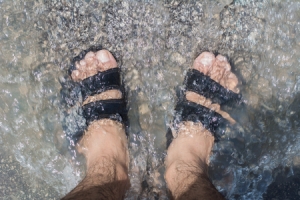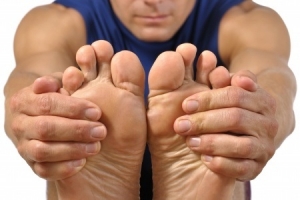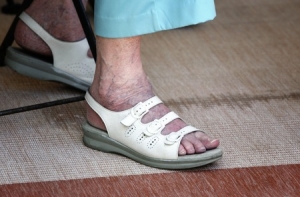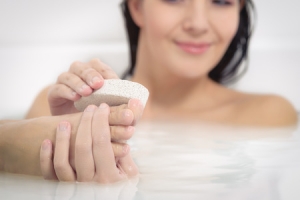Connect With Us
Blogs
Displaying items by tag: fungal infections
7 Ways To Prevent Fungal Foot Infections
A common problem that we at Superior Foot & Ankle Care Center treat in our Los Angeles County patients is fungal infections. Conditions such as athlete’s foot and toenail fungus are very uncomfortable and can easily spread to other parts of the body as well as other people. Most fungal infections are spread by direct contact. That means there are several precautions you can take to greatly reduce your risk. Below are seven tips to help you avoid fungal infections.
- Keep your feet covered in public places. Gyms, community pools, nail salons, and seaside restrooms and changing areas all see a heavy amount of barefoot traffic. Wearing flip flops or shower shoes will prevent your feet from coming in contact with surfaces where the fungi have been deposited.
- Wash your feet daily and dry completely. This simple act will go a long way to keeping fungal and other infections away. Take extra care to dry between your toes as this is where athlete’s foot most often starts.
- Make sure socks stay dry. Fungi love dark, moist places—that’s why the inside of your socks and shoes are the perfect breeding ground. If your feet tend to perspire profusely, keep an extra pair of socks with you and change as soon as you notice your feet feel damp.
- Use foot powder. A dusting of an anti-fungal or talcum powder will aid in keeping feet dry throughout the day.
- Don’t share items that touch another person’s feet. Socks, shoes, nail files, clippers, and even towels can be a vehicle to pass on a fungal infection.
- Choose shoes made of breathable materials. This will allow for air circulation around your feet and reduce the amount of moisture trapped in your shoes.
- Alternate your shoes. It’s helpful to allow shoes to air out for a day or two between wearings.
If you are experiencing red, itchy, flaky skin on your feet or nails that are discolored, thickened, and crumbly it’s important that you schedule an appointment at our Long Beach office at (562) 420-9800. Our podiatrists, Dr. Victoria M. Foley and Dr. Constance Ornelas, will examine your feet and prescribe the correct treatment if you have a fungal infection.
Healthy Foot Habits for the New Year
January is a time for making a fresh start and resolving to make positive changes. At Superior Foot & Ankle Care, we’d like to encourage our Los Angeles County patients to take some steps to ensure healthier feet and ankles in 2021. Below are some easy tips to implement:
- Commit to a Basic Hygiene Regimen—Did you know that simply washing your feet daily with soap and water and drying them thoroughly can significantly reduce your risk of fungal infections? If you add a dusting of a foot or fungal powder in the morning and a rich moisturizer at night before bed, you’ve got a fast and effective foot care plan.
- Check Your Feet for Changes—It’s easy enough while you’re cleaning your feet to look them over for any symptoms that may signal a developing problem. Check for toes that appear to be moving out of place, bruises, swelling, wounds that are slow to heal, discoloration of skin or nails, and any growths or lumps. If you notice something concerning, contact our Long Beach office by calling: (562) 420-9800 to make an appointment with our podiatrists, Victoria M. Foley and Dr. Constance Ornelas, to examine your feet and diagnose any problems.
- Keep Up with Nail Care—Trim toenails regularly and file any rough edges to prevent them from getting caught and tearing. Always cut nails straight across and be careful not to make them too short or they will be in danger of becoming ingrown.
- Choose Shoes Wisely—One of the single biggest steps you can take to prevent many common foot disorders is wearing good shoes. Look for styles that are made of soft, flexible material and have roomy toe boxes. Good arch support and a cushioned insole are also important. Limit time spent in high heels as these can harm your feet and cause bunions, hammertoes, and other deformities.
- Make Healthy Lifestyle Choices—Regular exercise, a healthy diet, and getting enough sleep all impact the condition of your feet as well as the rest of your body. Don’t try to change everything at once. Small changes that you can sustain will have big payoffs in the New Year!
If you have questions about the care of your feet, don’t hesitate to contact us.
Holiday Season Do’s and Don’ts for Healthy Feet
Although the radio may be proclaiming “It’s the Most Wonderful Time of the Year,” we at Superior Foot & Ankle Care Center know that the feet of our Los Angeles County patients may not agree. It’s a time of year with lots of extra errands to run, cooking and shopping to do, and being on your feet for longer periods than usual. However, you can sail through the season feeling “merry and bright” if you follow the do’s and don’ts below to keep your feet and ankles healthy and pain-free.
Do: go easy on holiday feasting. Yes, there will be lots of delicious sweets and treats on the menu, but come January extra weight gain could result in added stress and pain for your feet. Many common conditions such as plantar fasciitis, sesamoiditis, and metatarsalgia are all aggravated by carrying additional pounds. If you suffer with diabetes or gout, you need to pay particular attention to what you put on your plate. Go for small quantities of your favorites to savor and compensate by not loading up on unnecessary carbohydrates. Avoid going back for seconds!
Don’t: allow your feet to stay in damp socks. Whether you’ve stepped in a puddle or your feet are sweating during a long day of shopping, it’s essential to not let feet stay where it’s moist. Damp, dark, closed-in spaces (like the insides of your shoes) are the perfect breeding ground for fungal infections. Pack an extra pair of socks and change into them when you notice feet feel sweaty. Use foot powder before you put on socks.
Do: carefully consider footwear choices. When you know you’re going to be on your feet for several hours or doing an above-average amount of walking, make sure the styles you choose are comfortable and have good arch support and non-stick treads. Limit the amount of time in high-heeled party shoes!
Do: leave extra time in your schedule for making appointments. Rushing is when you’re most likely to not see an object in your path which can cause an ankle sprain or other injury.
Don’t: put off getting foot pain evaluated by our podiatrists, Dr. Victoria M. Foley and Dr. Constance Ornelas. This can result in a podiatric problem getting worse and potentially requiring longer and more invasive treatments. Make an appointment at our Long Beach office by calling: (562) 420-9800 today.
6 Tips for Protecting Your Feet with Diabetes
At Superior Foot & Ankle Care Center, we know that diabetes can affect your skin, joints, and bones in a number of ways. Two conditions associated with the disease—peripheral arterial disease (PAD) and neuropathy—are of particular concern when it comes to your lower extremities. PAD is a narrowing or blocking of the arteries to your legs, which can lead to poor circulation. This means that nutrient and oxygen-rich blood necessary for healing cannot reach your legs, feet, and toes as quickly as needed. Neuropathy is nerve damage that can result in loss of feeling in your feet, which makes it difficult to perceive pain and injury. This double whammy means that patients with diabetes are at a higher risk for a host of podiatric problems, including:
- Ulcers and wounds that do not heal properly
- Fungal infections
- Hammertoes
- Ingrown toenails
- Corns and calluses
Difficulty healing can cause even minor foot and toe problems to become major threats with the potential for infection and even amputation. Below are some ways you can be proactive in preventing foot problems if you have diabetes:
- Control your blood sugar. Follow all your doctor’s instructions for managing your diabetes. Watch your diet, take your medications as directed and regularly test to make sure you are on track.
- Schedule regular podiatric checkups. Our podiatrists, Victoria M. Foley or Dr. Constance Ornelas, will work with you to prevent potentially dangerous foot issues. Seeing the foot doctor regularly will increase the chances of catching injuries and infections in their very early and most treatable stages. The podiatrist can also help with nail care, wound debridement and diabetic footwear and orthotics.
- Keep feet clean, warm, and dry. Wash daily and dry thoroughly—especially between your toes. Use a foot powder before putting on socks.
- Make sure shoes fit correctly. Avoid styles that have narrow toe boxes are that are made of very stiff materials. Keep the heel height to 2 inches or less.
- Don’t walk barefoot. This dramatically increases your chances of getting athlete’s foot or a fungal toenail infection, which are contracted by direct contact. You are also more likely to step on a sharp object and injure your foot without shoes.
- Conduct regular self-exams—it’s important that between appointments you are checking your feet and toes daily for any signs of rashes, cuts, blisters, bruises, growths or other indicators that a foot problem is developing. If you can’t see your whole foot as a family member or caregiver to assist you. Contact our Long Beach office immediately by calling (562) 420-9800 if you find anything concerning.
4 Common Foot Problems for Men
June is a month for celebrating men! At Superior Foot & Ankle Care Center, we want to recognize Men’s Health Month by highlighting some foot infections that afflict men. Studies show that men are less likely to be proactive and diligent about getting medical care. Encourage the men you love to get foot problems treated promptly by our podiatrists, Dr. Victoria M. Foley or Dr. Constance Ornelas. Below are some common podiatric issues men face.
- Haglund’s Deformity—while this condition, known as “pump bump,” it frequently affects men as well as women. Haglund’s deformity is a bony enlargement at the back of the heel that can become inflamed and irritated from the friction of stiff dress shoes and other footwear rubbing up against it. Bursitis can also develop because of Haglund’s deformity. The foot doctor will recommend shoe modifications, including changes in style and heel lifts or pads to help reduce friction. Icing and anti-inflammatory medications may be prescribed to relieve initial pain and inflammation.
- Gout—this painful, arthritic condition that usually strikes the joint at the base of the big toe is seen most often in men, ages 40-60. It is caused by too much uric acid in the body, which crystallizes in the joint. There are several potential sources of gout, and the podiatrist will help men who have suffered a gout attack before tracking down the cause. In many cases, certain foods can trigger an attack, and gout patients may need to avoid shellfish, red meat, alcohol, and rich sauces.
- Fungal Infections—regular exercise is a key component of a healthy lifestyle, but if the gym or community pool is the work site of choice, it’s essential to keep feet covered to avoid fungal infections like athlete’s foot and fungal toenails. These are passed on by direct contact. Places where people usually are barefoot and that are moist and warm are prime breeding grounds.
- Plantar Fasciitis—one of the most frequent causes of heel pain is plantar fasciitis. The plantar fascia is a long band of tissue that stretches along the bottom of your foot. If it becomes inflamed, heel pain may result. Flat feet and poorly fitting or worn out shoes are one common cause of inflammation.
Encourage your man not to ignore foot and ankle pain. Instead, make an appointment at our Long Beach office today by calling: (562) 420-9800 and get treatment before the problem worsens.
Avoid Summer Foot Hazards
During the summer months your feet experience some particular challenges. At Superior Foot & Ankle Care Center we want to alert our patients to some potential foot and ankle problems and ways to prevent them.
Puncture Wounds and Cuts—going bare foot increases your risk of stepping on a sharp object. If this does happen and you sustain a puncture wound or cut be sure to clean it out completely and apply an antibiotic ointment and a bandage. Avoid swimming in lakes or the ocean while the wound remains open to prevent an infection from developing. If the area around the wound starts to feel warm or you notice redness or any pus or discharge, contact our Long Beach office immediately by calling: (562) 420-9800. Our podiatrists, Dr. Victoria M. Foley or Dr. Constance Ornelas will examine your foot and determine if you need treatment.
Fungal Infections—athlete’s foot, fungal toenails and warts are among the bacterial and fungal infections that are spread by direct contact. For this reason, we recommend keeping your feet covered in public places like community pools, gym locker rooms and showers and the nail salon.
Heel Pain—if flip-flops are your summer go-to shoes, you may notice an increase in heel pain. The average pair of flip-flops provides no arch support. Flattening of the arch exerts more pressure on your heel. If this is your footwear of choice, invest in a pair designed with sturdy soles and built in arch support.
Ankle Sprains—unfortunately many other summer shoe styles are also lacking in side, ankle and arch support. While these may be fine for dinner out or a special occasion, be sure not to wear them for extended periods of walking or sports activities as this likely to result in an ankle twisting injury.
Fortunately, a little common sense and smart choices can go a long way toward protecting your feet this summer. If you have foot pain or discomfort, don’t hesitate to contact us for an appointment.
5 Best Practices for Older Patients
At Superior Foot & Ankle Care Center, we take care of the feet of patients of all ages. This month—Older Americans Month—we want to offer some information for taking good care of senior feet. While it’s true that some conditions are more likely to occur with age, there are still many ways to prevent disabling problems and ensure that your golden years remain active. Below are 5 tips for better foot health for older patients:
- Keep feet clean and dry. Wash feet every day with warm soapy water and dry completely. If you tend to sweat excessively, use an anti-fungal powder each morning and change your socks as soon as you notice that they feel damp. This will go a long way in preventing athlete’s foot and other fungal infections.
- Inspect your feet weekly. Look for changes in shape, color of skin and toenails, lumps or growths, rashes, bruising and swelling. Report anything that seems abnormal to our podiatrists, Victoria M. Foley or Dr. Constance Ornelas so they can evaluate your feet and determine if a condition exists that needs treatment.
- Maintain good circulation. This means not smoking and avoiding standing or sitting—especially with your legs crossed– in one position for a prolonged period of time. Don’t wear tight hose and socks.
- Move it along. Exercise will also help with circulation. In addition, it will keep feet and ankles flexible, maintain good range of motion and control weight.
- Buy good shoes. Roomy toe boxes, soft and flexible materials and a proper fit will help you avoid many common foot problems. Forgo heels that are higher than two inches and rotate your shoes from day to day.
Don’t put off making an appointment if you are experiencing foot pain or discomfort. This leads to an increase risk of falls and the chance that your condition will worsen and require more invasive treatment. Contact our Long Beach office today for an appointment by calling: (562) 420-9800.
Plantar Fasciitis
The plantar fascia is a connective tissue in the heel that stretches across the bottom length of your foot. Plantar fasciitis occurs when the connective tissue becomes inflamed, causing heel pain and discomfort during physical activity. Although the condition is completely treatable, traditional methods can take up to a year to start becoming effective.
Plantar fasciitis is caused by a number of everyday activities, so understanding the condition is important for managing and treating it. One of the most common causes of plantar fasciitis is excessive running, especially with improper fitting or non-supportive shoes. Too much exercise can lead to the plantar fascia being overworked and overstretched, which can cause tears in the tissue. Along with improper fitting shoes, pronation, the rolling of the feet inward, is a common cause of plantar fasciitis. If not treated properly, the plantar fascia becomes overstretched and starts to tear, causing inflammation.
Despite the common causes of plantar fasciitis, there are many different treatment options. For less severe cases, conservative home remedies include taking anti-inflammatory drugs to alleviate pain, applying ice packs to the bottom of your foot and heel, slowly stretching and exercising your feet to re-strengthen the tissue, and using orthotic devices are all ways to help manage your plantar fasciitis.
For more severe cases, shockwave therapy has become a common solution for plantar fasciitis. Shockwave therapy can effectively break up the tissue on the bottom of your foot which facilitates healing and regeneration. This fights the chronic pain caused by plantar fasciitis. Even if this doesn’t work, surgery is always a final option. Surgery on the tissue itself can be done to permanently correct the issue and stop the inflammation and pain in your heels.
No matter what the case may be, consulting your podiatrist is the first and best step to recovery. Even the slightest amount of heel pain could be the first stage of plantar fasciitis. Untreated symptoms can lead to the tearing and overstretching of tissue. Because the tearing of tissue can be compounded if it remains ignored, it can evolve into a severe case. The solution is early detection and early treatment. Talk to your podiatrist about the possibilities of plantar fasciitis if you’re experiencing heel pain.
Resolve to Get in Shape—Safely
Is starting a new fitness plan one of your New Year’s resolutions? At Superior Foot & Ankle Care Center we applaud this initiative, but also add a word of caution. We see too many patients who fail to take the necessary steps to ensure that their new fitness plan is safe. Prevent injuries and get your healthy resolution off to a smart start by taking into consideration the following.
Your Current Condition—do you suffer from any chronic foot or ankle disorders such as flat feet, plantar fasciitis or hammertoes? Our podiatrists, Dr. Victoria Foley or Dr. Constance Ornelas, can help you determine the best type of exercise and footwear to accommodate an existing podiatric condition. In some cases, special padding or even a custom orthotic device may be prescribed to make exercise more comfortable.
Long-term Goals—in order to determine the type of exercise to do, you need to know what your goals are. Do you want to lose weight? Have more strength and endurance? Improve flexibility and balance? Your general physician and exercise professionals can help match your goals to fitness activities and sports that will best achieve them.
Gear—in our opinion, your footwear is the most important piece of equipment for a new fitness program. Be sure that you get the right shoes for your sport and that they fit properly. If the foot doctor has recommended an orthotic, be sure it fits in your sports shoes. Look for socks that are not too bulky and ones that wick moisture away from your skin to prevent athlete’s foot and fungal infections.
Now you’re ready to begin. Start slow and gradually increase the degree of difficulty of your work out. If your feet or ankles hurt from your new exercise plan, contact our Long Beach office for an appointment by calling: (562) 420-9800.
Do’s and Don’ts for Better Foot Health
At Superior Foot & Ankle Care Center we want to encourage our patients to be proactive in the health of their feet. There are many ways that you can help prevent foot and ankle disorders.
Below are some basic foot care tips:
- Practice good podiatric hygiene. Wash your feet daily with soap and warm water. Drying feet completely, especially between the toes will help prevent athlete’s foot and other fungal infections.
- Don’t walk barefoot. Even in the comfort of your own home going barefoot increases the risk of puncture wounds from stepping on a sharp object hiding in the carpet or stubbing your toe or foot. In public places, walking with bare feet is an invitation for contagious podiatric conditions such as fungal toenails and
- Always use sunscreen on your feet when you are outside, and feet are exposed. This goes for days when you are out walking in open sandals as well as when you are at the beach or pool.
- Take care of toenails. Keeping toenails trimmed straight across (never with curved edges) and not too short reduces the risk of getting an ingrown toenail.
- Examine your feet periodically. Look for changes in nail or skin color, bruising, swelling, bumps, rashes and redness. Unusual changes can be a sign of a foot problem. If you notice anything concerning, contact our Long Beach office for an Our podiatrists, Dr. Victoria Foley or Dr. Constance Ornelas, will examine your feet and determine if a problem exists, that requires treatment.
- Don’t attempt to treat yourself. “Bathroom surgery” conducted by patients trying to shave corns, or calluses, remove warts or ingrown nails can lead to severe injury and infection. The podiatrist best handles those tasks.
- When in pain, seek treatment. Ignoring foot pain will usually result in condition getting worse. Don’t delay, contact us by calling: (562) 420-9800.









